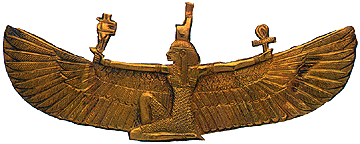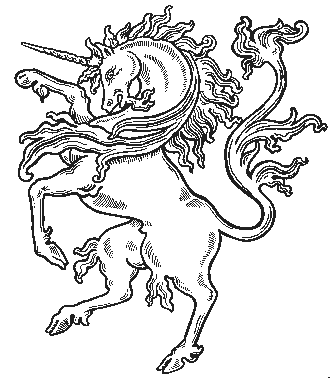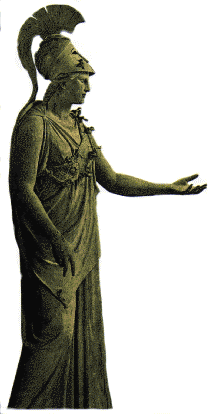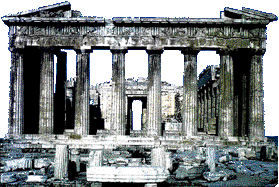Principal Divinities of Mythology
| GREEK DEITIES |
ROMAN EQUIVALENT |
PROVINCE |
| Aphrodite |
Venus |
Love |
| Apollo |
Apollo |
Light; healing; poetry;
music; prophecy |
| Ares |
Mars |
War |
| Artemis |
Diana |
Nature; the hunt; the moon |
| Athena |
Minerva |
Wisdom |
| Demeter |
Ceres |
Grain; dry products of the earth |
| Dionysus or Bacchus |
Liber |
Grapes; wine |
| Hades or Pluto |
Dis |
The Underworld; the dead |
| Hephaestus |
Vulcan |
fire; crafts |
| Hera |
Juno |
Life of women including:
marriage and childbirth;
Queen of the gods |
| Hermes |
Mercury |
Commerce; travel |
| Hestia |
Vesta |
Hearth and Home |
| Poseidon |
Neptune |
Sea; earthquakes |
| Zeus |
Jupiter |
Sky; king of gods and men |
Mythology in Western Art

Links to Greek Mythology
Roman Mythology
Greek myths were adapted by the Romans, who originated almost no mythology of their own except a few tales about early Rome and events that led toward its founding. However, the Romans were important in preserving the Greek mythological heritage and transmitting it to later European civilizations.
Links to Roman Mythology
Norse Mythology
Second to Greek and Roman mythology in its appeal to later centuries is the Norse and Teutonic mythology. The Norsemen, including all Scandinavians, and the Teutons, were descended from Indo-Europeans, as were the Greeks, and there are striking similarities in their myths. The Norse myths, transmitted by word of mouth, were not written down until the 13th century. At the time, a number of heroic and mythological poems were collected and recorded in Iceland. These poems, called the Elder, or Poetic, Edda, had been composed between the years 800 A.D. and 1200. The Younger Edda, written in prose around 1222, is the principal source of information about Norse Mythology.
Norse Mythology
| DEITY |
PROVINCE |
| Balder |
Sun; light; wisdom |
| Frey |
Sun; rain; fertility; love; marriage
|
| Freyja |
Love; beauty; fertility; love; marriage |
| Frigga |
Nature; marriage; the home; queen of the gods |
| Loki |
Fire; strife; evil |
| Odin |
Sky; war; wisdom; poetry; magig;
king of the gods |
| Thor |
Thunder and lightening; war; agriculture;
protector of men |
Links to Norse Mythology
 Viking Links
Viking Links 
Egyptian Mythology
| DEITY |
PROVINCE |
| Anubis |
The dead; embalming |
| Geb |
Earth |
| Horus |
Sun; light |
| Isis |
Earth; moon; nature; magic;
worshipped as a mother goddess |
| Nephthys |
The dead |
| Tefnut |
Sky; childbirth |
| Osiris |
Fertility; the Nile; vegetation; the dead |
| Re |
Sun; sky; creation |
| Seth |
evil |
| Tefnut |
Moisture |
| Thoth |
Learning; magic |




Links to Egyptian Mythology




Types of Myths
There are many types of myths. However, most of them can be classified as nature myths, semihistorical myths, myths of explanation, creation myths, or myths about the world of the dead.
Nature Myths
Semihistorical Myths
Myths that have some historical basis are called legends. Such myths had their origin in historical events, but the facts were changed and exaggerated through the course of time. Some myths about heroic men in the early periods of various nations are believed to have arisen around the names of famous kings and princes who had actually lived. After death, their courage and achievements were magnified in songs and tales, often to the extent of including deeds humanly impossible.
A major event in Greek mythology was the Trojan War. Many ancient Greek states, it was believed, had been represented in this war by one of the heroes mentioned in Homer's Iliad. However, the Trojan War was considered entirely mythical by scholars until the discoveries made by Heinrich Schliemann near the end of the 19th century. His excavations on the hill of Troy in Asia Minor (now in Turkey) proved that there had been several ancient cities on that site and that one of them belonged to the period recently ascribed to the Trojan War, which occurred between 1240 and 1230 B.C. This and other archaeological discoveries, such as the fact that the city of the Trojan War was destroyed by a man-made fire, indicate that myths based on the Trojan War are semihistorical.
Semihistorical Links
Myths of Explanation
Creation Myths

Adopt-a-Unicorn!
Mythical Beasts and Creatures


Myths About the World of the Dead

Return to The Literature Nook Home Page

Return to theChildren's Literature Home Page
For questions, comments, or suggestions, please  Jeanne at: abc123@powernet.net
Jeanne at: abc123@powernet.net
I am a proud member of the HTML Writer's Guild

 also belong to the following organizations:
also belong to the following organizations:

Book Lover's Club

Web Prestige


Phenomenal Women of the Web
Credits:
Egyptian graphics courtesy of The Chihuahua Pharaohs

to stop by since June 8, 1997.




 The richest known mythology is that of the ancient Greeks. It inspired their own poets, then those of Rome and later all whom Roman culture reached. Its influence is found in much of the finest literature, sculpture, and painting produced in Europe and America.
The earliest sources of Greek mythical tales are the works of the poets Homer and Hesiod.
The richest known mythology is that of the ancient Greeks. It inspired their own poets, then those of Rome and later all whom Roman culture reached. Its influence is found in much of the finest literature, sculpture, and painting produced in Europe and America.
The earliest sources of Greek mythical tales are the works of the poets Homer and Hesiod.


 Viking Links
Viking Links 










 Jeanne at: abc123@powernet.net
Jeanne at: abc123@powernet.net

 also belong to the following organizations:
also belong to the following organizations:



